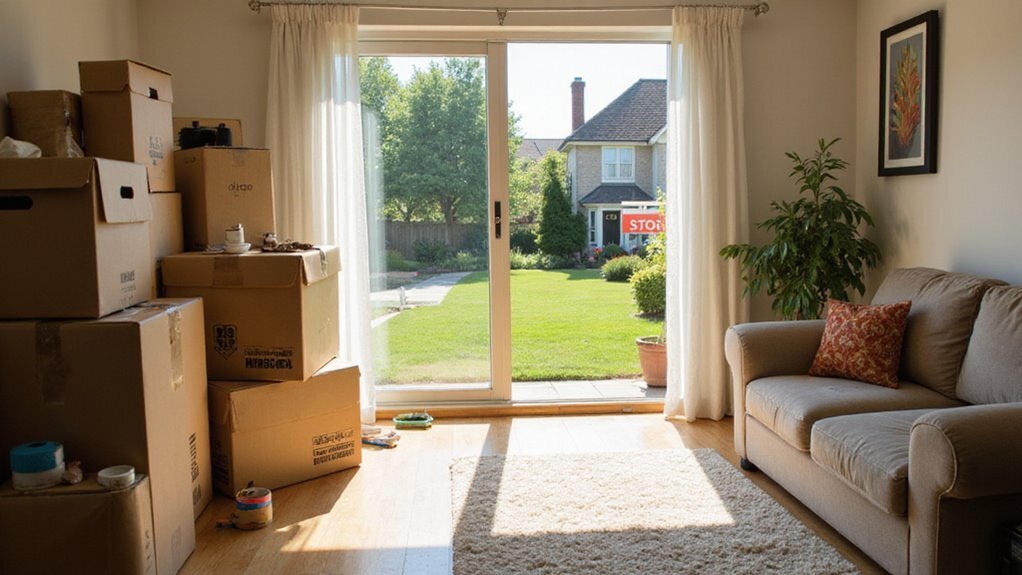Relocating forces you to make a tough decision: should you sell your home or rent it out? Both options have financial and personal consequences. Making the right choice can affect your wealth and peace of mind for years.
This decision is stressful because it involves many unknowns. Market trends change quickly, and your future plans may be uncertain. If you make the wrong move, you risk losing money or flexibility.
The best choice depends on your goals, the local market, and your financial needs. By weighing key factors, you can make a smart move. Careful analysis helps you protect your future. This blog will guide you through the options and help you choose the best path when relocating.
Key Takeaways
- Compare estimated rental income against mortgage, taxes, and maintenance costs to determine if renting is financially viable.
- Assess current local real estate market trends to decide if selling now will maximize your profit or if renting offers better returns.
- Consider the impact of rising or falling interest rates on buyer demand and rental market strength in your area.
- Evaluate your willingness and ability to manage property maintenance, tenants, and legal responsibilities as a landlord.
- Reflect on your long-term goals, emotional attachment to the home, and whether you may want to return or need future cash flexibility.
Assessing Your Financial Situation

You should review your finances before choosing to sell or rent your home. List your mortgage balance, other debts, and cash savings. Add the costs of any needed repairs or upgrades. If renovations are necessary, check if they will increase your home’s value. Homes in safer neighborhoods usually get better tenants and higher rent. Consider if your area supports steady rental income.
Compare your estimated rental income to your expenses. You need to cover the mortgage, taxes, insurance, and maintenance. If your income does not cover these, selling may be better. If you want to avoid the hassle and time-consuming expense of a traditional sale, selling for cash may be a practical option.
Think about the possible tax effects of selling or renting. If you are unsure, ask a financial advisor for advice. Careful review will help you make the best choice for your situation.
When deciding, remember that selling your home as-is can provide a hassle-free, quick alternative if you want to avoid repair costs and speed up your relocation.
Understanding the Local Real Estate Market
A clear view of your local market helps you decide whether to sell or rent. You should check how much homes have sold for recently. Local rules and community features also affect your options. If you inherit a property, coordinating with heirs and understanding the legal process is critical before making a decision.
If demand is low and many homes are for sale, renting can be better. Low supply usually means higher sale prices. You should always compare both before choosing.
Local zoning laws may change how you use your property. If new rules limit rentals, selling could be smarter. Always review these laws before making a move.
Homes near good schools, shops, or parks attract more interest. If your place is close to these, you may get more buyers or tenants. Amenities can raise both your sale price and rental income.
When selling a home, having a clear title is essential, as it ensures there are no legal complications or claims that might affect the transaction.
Evaluating Potential Rental Income

To estimate how much rent your property can earn, check what similar places charge nearby. Look at recent rental listings and past prices. This gives you a clear idea of what renters will pay.
Vacation rentals may earn more if your area attracts tourists. These rentals can have higher income but may sit empty more often. Managing short-term rentals also takes extra time and effort. If you want to avoid the hassle of listing and managing frequent turnovers, a long-term rental or other sale options may suit you better.
If your property allows commercial use, compare possible income from business tenants. Commercial leases can last longer and bring steady payments. Local business demand will affect your rental rates.
Check average occupancy rates and note any seasonal changes. Homes with special features or good locations can charge higher rent. Updated amenities or close access to businesses often boost your rental income.
Before setting your rental price, consider if there are any mold issues in your home, as these can affect both demand and the amount renters are willing to pay.
Calculating the Costs of Selling
Selling your home comes with several costs that reduce your final profit. You need to know these expenses before making a decision. If you plan carefully, you can avoid surprises at closing.
Home staging can make your house more attractive to buyers. These costs can range from a few hundred to a few thousand dollars. If you skip staging, your home might take longer to sell. In some situations, selling to cash home buyers can help you avoid staging costs and speed up the selling process.
Moving costs should be included in your budget. These usually range from $1,000 to $5,000 depending on how far you move and how much you own. If you move a long distance, expect higher costs.
Real estate agent commissions are a major expense. Agents usually charge 5% to 6% of the sale price. If you sell without an agent, you can avoid this fee but may need to handle more work yourself.
To ensure you don’t overprice your home and delay the sale, it’s important to price your home right by consulting a professional or researching the market before listing.
Weighing the Expenses of Becoming a Landlord

Becoming a landlord has many costs you should consider before renting out your home. You will pay for property management, repairs, insurance, and possible vacancy periods. These expenses can add up quickly and reduce your profits. You should also be aware that your mortgage loan type may affect your monthly payments and influence your rental strategy.
Vacation rentals and short-term leases may offer higher income, but they come with more costs. You will likely pay more for cleaning, repairs, and frequent tenant turnover. If you choose this option, expect your expenses to rise by at least 25%.
Local rules may also affect your ability to rent out your property. Some places require special permits or limit how often you can rent. Always check local regulations before deciding.
If you want to succeed, make detailed financial plans. Your rental income should cover all costs and provide a profit. Careful planning helps you avoid surprises and make a smart decision.
If the costs and hassles of becoming a landlord feel overwhelming, consider the direct house buying process as a way to quickly sell your property and avoid these ongoing expenses.
Considering Tax Implications
Understanding tax implications is important when renting or selling your home. Taxes can affect your total profit or loss. You need to consider both rental and selling scenarios.
If you rent your home, you can claim deductions for mortgage interest, repairs, and management fees. These deductions can lower your taxable income from rent. They may help you keep more of your earnings each year. If you decide to rent instead of sell, keep in mind that homeowner tenure in Louisville is 8 years, which may impact your long-term rental strategy.
If you sell your home, capital gains taxes might apply. This tax depends on how long you lived in the home and how much profit you made. You may owe more tax if you do not qualify for the primary residence exclusion.
Depreciation recapture is another tax to consider if you sell a rental property. The IRS may require you to pay back some tax benefits you claimed while renting. This can increase your taxes after the sale.
When considering your options, it may also help to assess the possible return on investment for each scenario, as improvements or repairs could affect your overall tax burden and net proceeds.
If you are unsure, you should compare each option before deciding. The right choice depends on your financial situation and future plans. Always talk to a tax professional if you need help understanding your options.
Analyzing Market Timing and Trends

You’ll make a stronger decision if you track seasonal price fluctuations, monitor interest rate changes, and watch for shifts in local housing supply. Market data shows prices often peak in spring, while rising rates can dampen buyer demand. By analyzing these trends, you can time your sale or rental to maximize returns. Keeping an eye on proper pricing strategies can also help you attract buyers quickly and avoid the risks of overpricing or underselling your property. If you need to sell your house fast in New Albany, IN, there are options to receive a cash offer and close quickly, often in as little as 7 days.
Seasonal Price Fluctuations
Seasonal price fluctuations affect real estate markets every year. Knowing these changes helps you decide when to sell or rent. If you time your decision well, you can get better returns.
Home prices are usually higher in spring and early summer. More buyers look for homes during these months. If you sell in winter, you may get lower offers.
Rental rates often rise during summer when more people move. If you list a rental in winter, you might wait longer for tenants. Lower demand in off-peak months can force you to lower your price.
If you study these trends, you can choose the best time to act. This approach helps you match your goals with the market.
Interest Rate Impact
Interest rates strongly affect home sales and rentals. Higher rates make borrowing more expensive, which lowers buyer demand. Lower rates make homes more affordable and increase buyer interest.
Interest rates also influence the rental market. If rates rise, fewer people buy, so more people rent homes. When rates drop, more people buy, and rental demand can fall.
Sellers and landlords should watch interest rate trends. Changing rates can affect your timing and profits. If you time your sale or rental well, you may earn more.
If rates fall, more owners may refinance and keep their homes. This can reduce the number of homes for sale. A lower supply may push home prices up.
The table below shows the effects of interest rate changes:
| Interest Rate Trend | Market Impact |
|---|---|
| Rising | Fewer buyers, more renters |
| Falling | More buyers, higher prices |
| Stable | Balanced market activity |
If you plan to sell or rent, consider current interest rates. Your decision may have a bigger impact than you think. Proper timing could help you get the best results.
Local Supply Shifts
Local housing supply changes can strongly impact your selling or renting strategy. If supply increases, expect prices to drop and more competition. If supply drops, prices and rents may rise.
You should track monthly inventory reports to spot early trends. Market saturation levels help you see if competition is high or low. If many similar homes are available, you may need to lower your price.
Recent comparable sales and rentals show what buyers or renters are willing to pay. If these numbers drop, consider adjusting your expectations. If the market is hot, you might price higher or expect more offers.
Factoring in Emotional Attachments

Emotional attachments can strongly affect your decision to sell or rent your home. These feelings may be just as important as financial or practical reasons. If you ignore emotions, you might regret your choice later.
Childhood memories can make selling difficult. If memories are more important than money, you may want to keep the home. Family legacy might make you lean towards renting instead of selling. Deep connections to childhood memories or family legacy can sway you toward keeping or renting your home instead of selling.
Sentimental value can delay your decision. If you set clear emotional and financial goals, the process will be easier. Strong ties to the community can make it hard to leave.
If the stress of change worries you, planning a support system may help. Balancing emotional and practical factors leads to a choice you feel good about. If you weigh both, you are more likely to make the right decision.
Additionally, if you consider selling as-is due to financial or time constraints, recognizing your emotional ties to the property can help you make a more thoughtful and satisfying decision.
Projecting Long-Term Property Appreciation
You’ll want to assess projected long-term appreciation by examining recent market trends and analyzing sales data. Look at neighborhood growth indicators like new infrastructure, employment rates, and planned developments to estimate future value. This strategic approach helps you weigh the financial upside of holding versus selling your property.
Market Trends Analysis
To choose between selling or renting your property, you should look at current market trends and future price growth. Check recent sales and rental data to see how prices are changing. Use this information to guide your decision.
If there are too many similar homes for sale or rent, prices and rents might not go up. Demographic changes, like more young people moving in, can increase demand. This can affect how much your property may rise in value.
Look at three things: Are prices increasing or staying the same? Is there more demand for rentals because of population changes? Is there a lot of supply, or is it hard to find homes?
These factors help you match your choice with what is really happening in the market. If you use this data, you can make a smart decision.
Neighborhood Growth Potential
When deciding to sell or rent, check if your neighborhood is likely to grow. Property values often rise where there is future development. Areas with growth usually offer better investment returns.
Look at city plans, new roads, or changes in local population. New schools, shops, or train stations can make your property more valuable. If the area does not change much, prices may stay flat.
Check local data and future projects before choosing. These signs help you predict if your property will grow in value. If your neighborhood is growing, renting may let you benefit from future price increases.
| Growth Indicator | Impact on Property Value |
|---|---|
| New transit lines planned | Can raise property prices |
| More shops and offices | Increases local demand |
| Better schools | Attracts families, raises value |
| Upgraded roads or utilities | Makes area more desirable |
Reviewing Your Relocation Timeline
Your relocation timeline affects when you can sell or rent your home. It is important to set clear dates and list any dependencies. If you plan well, you can avoid last-minute stress.
Remote work options may give you more time to move. If your job is flexible, you can adjust your moving schedule. If it is not, you may need to move quickly.
Family needs could change your plans. School calendars and childcare arrangements may set your moving dates. If your partner works, their job may also affect the timeline.
Compare how long it usually takes to sell a house versus renting it out. If you need funds fast, selling might be better. If you can wait, renting could be an option.
Careful planning helps you meet your financial and personal needs. If you review each factor, you can create a clear timeline. This approach makes the moving process easier.
Examining Property Management Options
Evaluating property management options helps protect your home and increase your rental income. You should compare different management styles, costs, and services before making a decision. Each option offers different levels of support and expertise. Compare management styles, costs, and services to find the right property management approach for protecting your home and maximizing rental income.
Full-service companies charge the highest fees, usually 8-12% of monthly rent. They manage all tasks, including marketing, tenant screening, and repairs. If you want less involvement, this is a good choice.
Hybrid management options cost less, around 5-8%, and let you handle some duties yourself. These companies often focus on community features and provide partial oversight. Owners who want some control may prefer this model.
Self-management has no monthly fees but requires more time and effort from you. Owners handle everything from finding tenants to fixing problems. If you have experience and time, this option offers the most control.
If you compare vacancy rates, tenant satisfaction, and maintenance response times, you can pick the best model for your needs. Your goals and resources should guide your decision. Make sure the option you choose aligns with your priorities.
Understanding Legal Responsibilities
You’ll need to ensure full compliance with landlord-tenant laws, which vary by state and can affect your bottom line. Property maintenance isn’t optional—data shows deferred repairs lead to higher costs and potential legal exposure. Structuring clear lease agreements will help protect your interests and reduce disputes down the road.
Landlord-Tenant Law Compliance
You must follow landlord-tenant law to avoid legal trouble and protect your rental property. These laws include federal and state rules. If you ignore them, you could face fines or lawsuits.
A lease must follow the law and list all rules clearly. It should explain what the landlord and tenant must do. If your lease is not legal, you may lose in court.
Landlords should respect tenant rights. Tenants have the right to privacy and fair treatment. If you break these rights, tenants might sue.
You should keep records of all rent payments and messages. This helps if there is a dispute. If you document everything, you can prove your case.
Managing the rules well lowers your risks. It also helps you make more money from your property. If you stay informed, you will avoid many problems.
Property Maintenance Obligations
Property maintenance is a legal duty for landlords. It helps keep tenants safe and satisfied. If you follow the law, you avoid fines and complaints.
Regular upkeep also keeps your property in good shape. Well-maintained homes attract better tenants and can bring higher rent. If you do not maintain the property, you may face bigger repair costs later.
Landlords should schedule inspections and fix problems quickly. Keeping records of all repairs is important. If you show tenants you care about upkeep, you are likely to find renters who respect your property.
Responsible maintenance protects your investment. It also helps you keep tenants longer and run a profitable rental business. If you meet your obligations, you support a stable and positive rental experience.
Lease Agreement Requirements
A strong lease agreement protects you and helps your rental business succeed. It sets clear rules for rent, deposits, and repairs. If you use a well-written lease, you are less likely to face legal issues.
Landlords should include rules for picking tenants to lower the risk of missed payments. Lease renewal steps must be clear, such as how and when to give notice. If you explain rent increases, you avoid confusion later.
Legal rules change, so owners must stay updated on rental laws. If you follow all rules, you avoid fines and legal trouble. A good lease with these parts keeps your property safe and profitable.
Planning for Unexpected Scenarios
Unexpected events can delay or increase the cost of your move. You should plan for job changes, repairs, or market shifts. Creating a backup plan helps you stay prepared.
Homeowners often face surprise repair costs between $4,000 and $8,000. If your new home is not ready, you may need storage for your belongings. Storage can cost $100 to $300 per month.
Rental market changes can affect how quickly you find tenants or set rent prices. If you research possible costs and risks, you can protect your finances. Careful planning helps reduce stress and keeps your move on track.
Making a Decision That Fits Your Lifestyle
Selling or renting your home should match your lifestyle needs. Each option affects your daily routine and financial goals differently. Consider your available time and energy for managing property.
If you want flexibility, short-term leases or vacation rentals may work, but they need active management. You must respond quickly to guest needs and handle frequent changes. Good management helps you earn more and avoid empty periods.
Think about your willingness to deal with new tenants often. Frequent travelers may need to hire help for vacation rentals. Selling your home gives you quick access to cash, while renting brings regular income.
Always review your needs and goals before making a decision. Your choice should fit both your finances and daily life.
Conclusion
When deciding whether to sell or rent your home during relocation, you should carefully consider your finances and local market trends. If you want fast cash and fewer responsibilities, selling may be the best choice. If you prefer long-term investment and can manage tenants, renting could be a good option.
If you need to sell quickly, OC Real Estate can help by buying your house for cash. This option can save you time and reduce stress during your move. You avoid the hassle of listing and waiting for buyers.
If you are ready to move forward, we encourage you to contact OC Real Estate today. We can guide you through your options and offer a fair cash offer. Let us help you make your relocation as smooth as possible.

